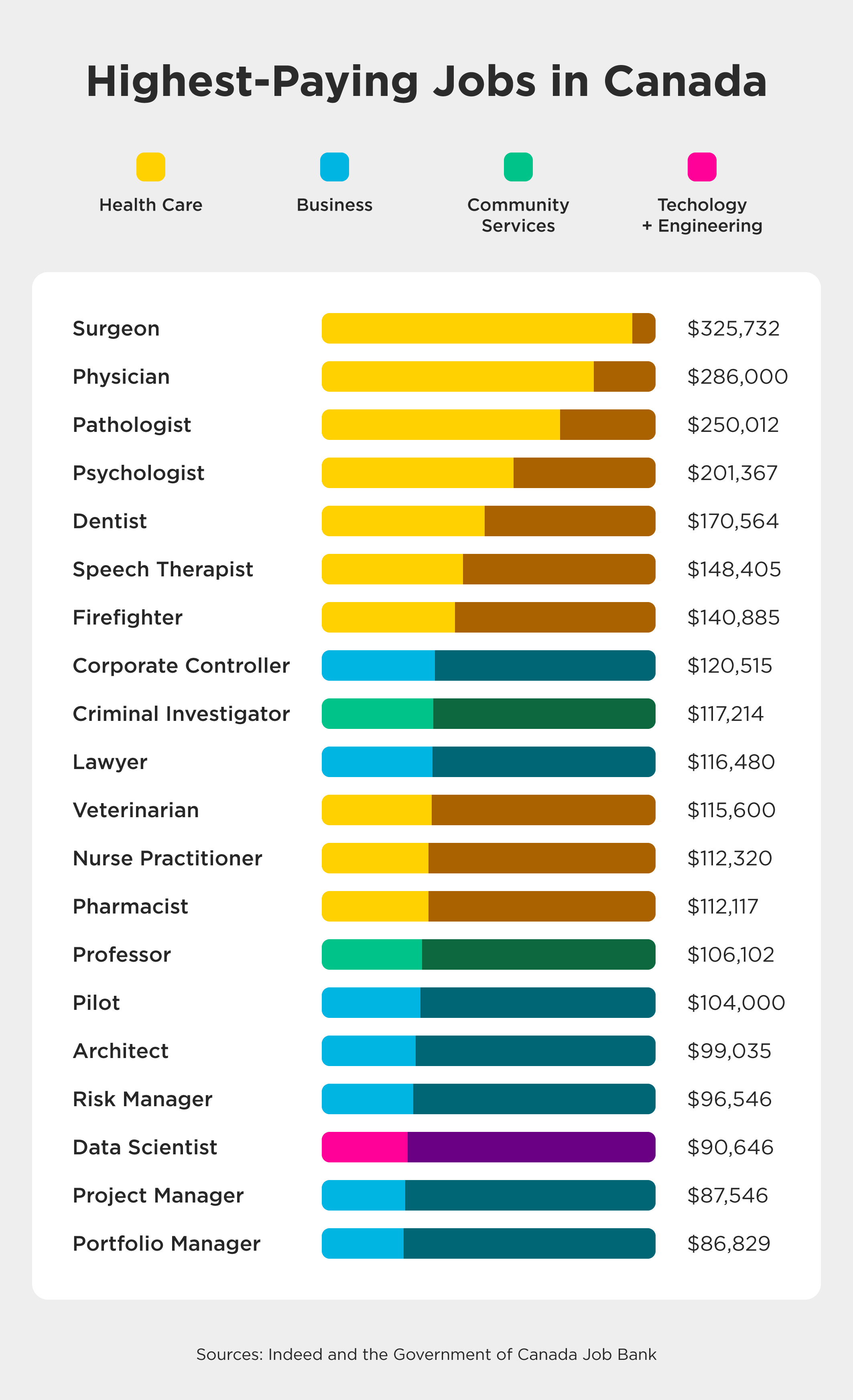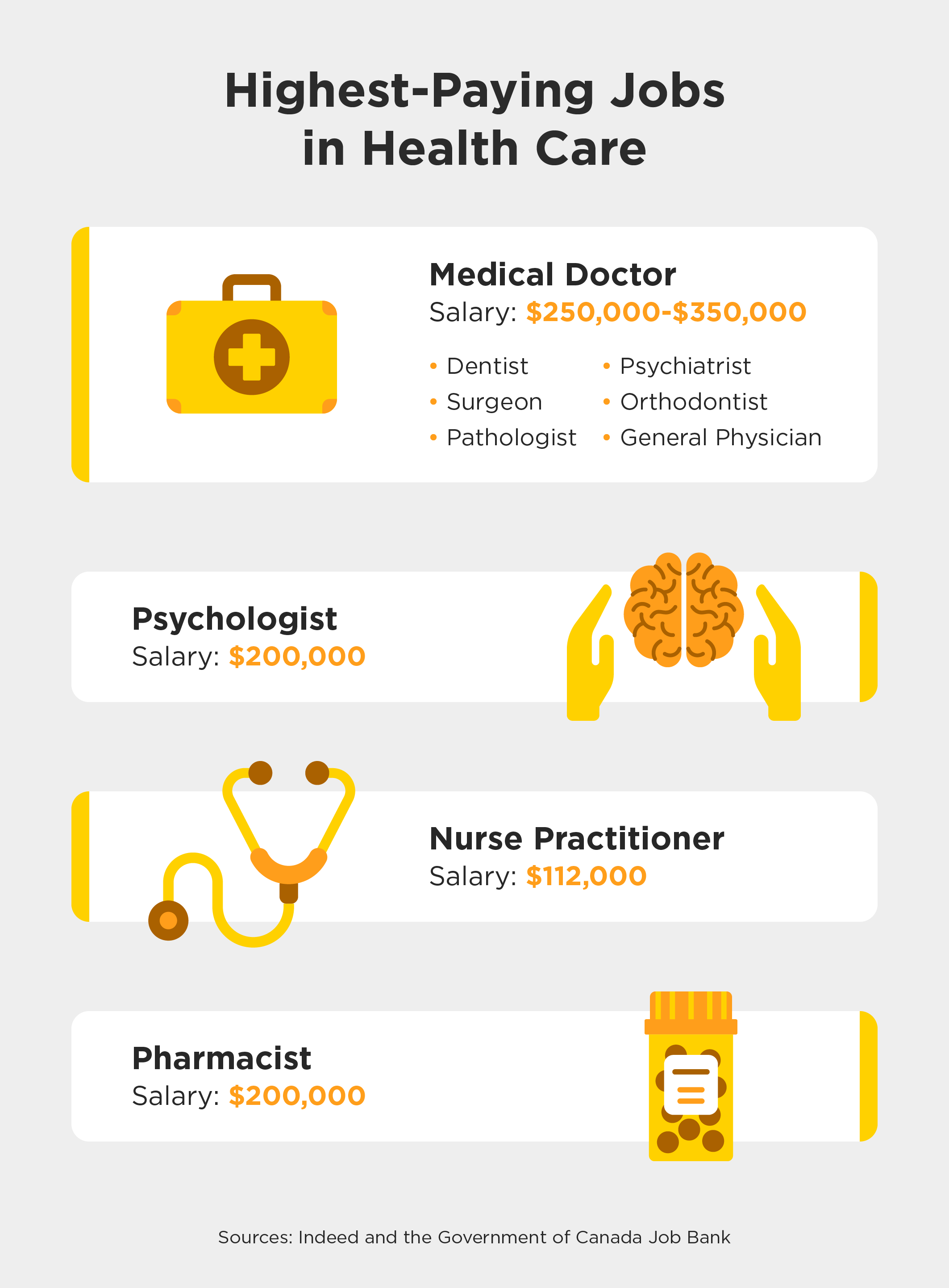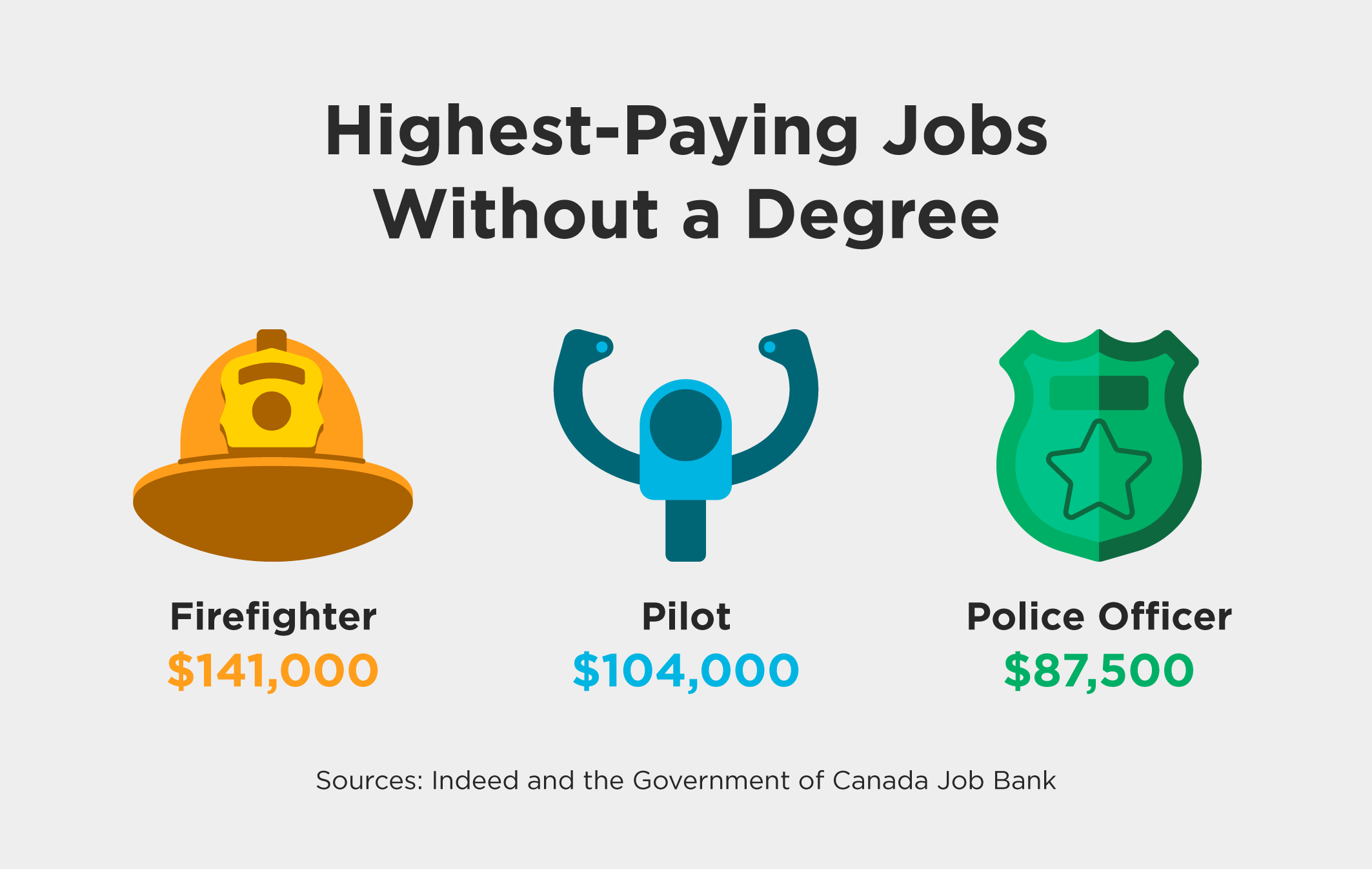The 27 Highest-Paying Jobs in Canada for 2024 (& How To Land One)

quick answer
The highest-paying jobs in Canada include medical positions like Surgeons, Physicians, Pathologists, Dentists, and Speech Therapists. Some high-paying jobs don’t require a Degree or Diploma, like Firefighters, Pilots, and Police Officers.
In This Article
There are thousands upon thousands of jobs in demand in Canada, and if you’re trying to choose a career path to pursue, it can feel impossible to know where to start. While your skills and interests are important, for many people, money is also a factor when choosing a career.
The highest-paying jobs in Canada include roles like Surgeons, Physicians, Pathologists, and Dentists. While these top-paying jobs offer strong compensation, they tend to require long timelines for education and training.
In this post, learn about what each of the highest-paying jobs entails, the average annual salary, and how long it may take to pursue that career path.
Average Annual Salary: $325,732
The average annual salary for Surgeons in Canada is $325,732. Surgeons are medical Doctors who specialize in operating on patients to treat injuries and diseases or alter appearances. They are also responsible for the diagnosis, procedure planning, and postoperative care plan.
Between education and residency, it takes about 13 years at least to become a general Surgeon. The required education is a Bachelor’s Degree followed by medical school, which typically totals eight years of study. All candidates complete a general surgery residency of five years, though many go on to complete a residency in a particular specialization for one to three years.
Here are some other types of surgical specialties and their average salaries:

Average Annual Salary: $286,000
The average yearly Canadian salary for a Physician is $286,000. Physicians are medical Doctors who perform basic medical exams, treat illnesses, and help patients manage chronic conditions and their general wellness.
There are countless areas to specialize in as a medical Doctor. Here are a few examples with their average salaries:
After an undergraduate degree, students will go to medical school, which, depending on how many courses you take per year, could take upwards of seven or eight years to finish all your schooling. After medical school, there are another three to seven years of residency programs where residents essentially act as interns. They’re paid, but it’s much less than a licensed medical Doctor’s salary. The process of becoming a doctor from start to finish varies by specialty.
Average Annual Salary: $250,012
The average yearly Canadian salary for a Pathologist is $250,012. Pathologists are a type of medical Doctor specializing in a research career. They study and help assist in diagnosing medical diseases and conditions through tissue and bodily fluids — often without visiting patients directly.
As medical Doctors, a career in pathology requires an undergraduate and medical school Degree followed by two to six years of residency. Similar to general Physicians, Pathologists can also specialize in an area of study or the body. For example, Forensic Pathologists perform autopsies to determine the cause and manner of a suspicious, violent, or unexpected death. Neuropathologists study the nervous system, Genetic Pathologists study genes, and Hematopathologists study blood.
Average Annual Salary: $201,367
The average annual salary for a Psychologist in Canada is $201,367. Psychologists study, diagnose, and treat the cognitive abilities, behaviors, and emotions of patients. They are similar to Psychiatrists but are not medical Doctors and cannot prescribe medications.
To become a Psychologist, candidates must complete higher education up to a Doctorate in the area of psychology. Throughout their studies, Psychologists can choose to pursue careers in fields like clinical, counseling, social, developmental, and education.
Psychotherapists are similar, but the title only requires a Master’s Degree. They earn an average of $108,636 in Canada.
Average Annual Salary: $170,564
The average yearly Canadian salary for a Dentist is $170,564, though it can reach upwards of $240,000 to $280,000 based on location. Dentists are medical Doctors who focus on teeth, gums, and general mouth health. They can be general practitioners or specialize in specific areas of the mouth.
Below are salary examples for dental specialties and careers within the dental field:
To become a Dentist, most students complete a four-year undergraduate Degree as well as four years in the dentistry faculty and licensure. Dentists have one of the highest average student loan debts in Canada.
If you’re interested in the field, check out our Dental Office Administrator program. Learn how to manage a dental office, including scheduling patients, handling insurance, and managing general office accounting.

Average Annual Salary:$148,405
The average yearly salary for a Speech-Language Pathologist or Therapist in Canada is $148,405. Speech-Language Pathologists (SLPs) evaluate, diagnose, and treat communication disorders, like:
To become an SLP, candidates must earn a Master’s Degree in speech-language pathology after an undergraduate Degree in a related field of study. Like most well-paying health care jobs, SLPs must also obtain registrations and licensure after passing a board exam.
Average Annual Salary:$140,885
The average yearly salary for a Firefighter in Canada is $140,885. Firefighters extinguish flames from the interior and exterior of buildings and rescue those unable to get out safely.
Firefighters do not need a post-secondary education, though a Diploma in fire science or fire systems may be beneficial if you hope to 8. Corporate Controller
Average Annual Salary: $120,515
The average yearly Canadian salary for a Corporate Controller is $120,515. Controllers are Accountants through certification, but Controllers are responsible for overseeing all the financial operations of a business. This includes accounting, financial analysis and reporting, compliance, strategic planning, and setting protocols.
Most Corporate Controller roles require at least a Bachelor’s Degree in finance, accounting, or business administration, plus internship experience and a CPA Certificate. However, you may stand out or earn more if you also have a Master of Business Administration Degree.
Corporate Accountants primarily focus mostly on bookkeeping. They earn $61,763 on average in Canada. If you’re interested in accounting or finance, get started with one of our programs.
In these programs, you’ll learn how to manage corporate accounting, bookkeeping, computerized accounting environments, payroll fundamentals, and more.
Average Annual Salary:$117,214
The average yearly Canadian salary for a Criminal Investigator is$117,214. Criminal Investigators work in the criminal justice system, solving cases and preventing crime. Their job entails collecting and reviewing evidence, interviewing suspects and witnesses, and making arrests.
Many Criminal Investigators start off as cadets and, through experience, get promoted into an Investigator role. Some complete four-year Bachelor’s degrees in criminal justice or criminology to kick-start their training.
Other well-paying law enforcement careers include:
Average Annual Salary: $116,480
The average annual Canadian salary for lawyers is $116,480. Lawyers specialize in many types of law, like criminal, marriage, corporate, and financial. They provide legal advice, research and gather evidence, write legal documents, and prosecute or defend in court.
Some areas of law may earn more than others. Here are a few examples of salaries among law specialties:
Judges are typically the highest-paid Attorneys, earning $365,551 on average annually. Judges are responsible for analyzing and interpreting evidence in court to ensure the laws are followed. They also announce a verdict and sentence individuals in court. In Canada, Judges must be appointed and have at least 10 years of experience practicing law.
The first step to becoming a Lawyer is completing a Bachelor’s Degree in a relevant area of study, followed by law school. The average Canadian law Degree can be completed in four years, which includes three years of schooling and one year of apprenticeship, before taking the Bar Exam to obtain licensure.
If you’re interested in law, check out ourLegal Assistant Diploma program or Paralegal Professional program. In these programs, you’ll gain an understanding of legal office procedures, legal transcription, and the basic components of various law practices.
Average Annual Salary: $115,600
The average annual salary for a Veterinarian in Canada is $115,600. Veterinarians treat injuries and illnesses in animals and provide preventative care. Some Vets specialize in caring for domesticated pets, like dogs, cats, reptiles, birds, and other small mammals. Others may visit farms, zoos, or even wildlife to treat their animal patients.
Veterinarians in Canada must earn an accredited Doctor of Veterinary Medicine Degree after a Bachelor’s Degree in a related field, which takes a combined eight years on average. Vets must also obtain the proper licensing to operate in their province. Specializations are typically completed through a residency or internship after graduation.
Interested in a career in veterinary medicine? Learn more about Robertson’s Veterinary Assistant program and start working in the field in as little as nine months.
Average Annual Salary: $112,320
The average yearly Canadian salary for Nurse Practitioners is $112,320.
Nurse Practitioners (NPs) are Registered Nurses (RNs) with an advanced degree, which broadens their scope of work. They assist Physicians in assessing, diagnosing, performing procedures, and prescribing treatments for patients. NPs can work in hospitals, specialist clinics, elderly care homes, schools, and other health care facilities.
Nursing specialties and shift work can also influence pay. Here are a few salary examples for careers within or related to the nursing field:
Most Canadian Bachelor of Nursing programs are four years in length and prepare you to work as an RN. The post-graduate program required to become an NP could add another one to two years of study. Obtaining licensure and/or certification is required for all nursing and adjacent positions before or within the first year of practice.
If you’re interested in nursing, check out our Nursing Assistant Diploma program. This program will prepare you to assist patients and health units in an administrative role.
Average Annual Salary: $112,117
The average annual salary for a Pharmacist in Canada is $112,117. Pharmacists work at drug stores, clinics, hospitals, schools, prisons, or military bases, where they:
At a minimum, Pharmacists must earn a Bachelor’s Degree in pharmacy followed by passing the national Pharmacy Examining Board of Canada (PEBC) exam and a practicum placement. Some Pharmacists complete their training through six years of post-secondary programs instead.
If a career in pharmacy interests you, check out our Pharmacy Technician or Pharmacy Assistant Diploma programs. In either program, you’ll learn about human anatomy, pharmacology, medical terminology, and more to prepare you for a career in the pharmacy setting. Pharmacy Assistants hold fewer responsibilities and capabilities than Techs, which is why Pharmacy Technician salaries are higher.
Average Annual Salary: $106,102
The average yearly salary for a Professor in Canada is $106,102. Professors teach at college and university levels, designing course curricula and leading lectures. Many Professors also continue to research throughout their careers by contributing articles to academic journals or publishing books.
Professors must hold post-secondary degrees. Full-time tenure-track Professors must hold a Doctoral Degree, while associate or adjunct Professors may work with a Master’s Degree.
Average Annual Salary: $104,000
The average annual salary for a commercial Pilot in Canada is $104,000. While “Pilot” is the standard term for anyone who flies an aircraft, this type of Pilot is paid to do so, typically for commercial airlines or cargo transport. Salaries vary for private or military Pilots.
Traditional post-secondary education is not required to become a Pilot. Training to become a commercial Pilot in Canada starts by obtaining a private pilot license. This certification requires 20 hours in the air with a flight instructor and 20 hours of solo flying.
Once completed, you can begin training for a commercial license. This equates to a minimum of 200 hours in-air — 100 of those hours spent as the Pilot-in-Command and 20 hours between cross-country flights. Candidates must also spend about 65 hours in flight training with an instructor and 80 hours of flight school.
Other provincial and national certifications may also be required.

Average Annual Salary: $99,035
The average annual salary for an Architect in Canada is $99,035. Architects design and oversee the construction of buildings — typically for commercial or government properties and sometimes residential. They manage both the aesthetics and structural plans of the build.
Architects in Canada have a few options on how to complete school and training, including:
After studying, internships — three years on average — are required before obtaining licensure.
Average Annual Salary: $96,546
The average yearly Canadian salary for Risk Managers is $96,546. Risk Managers measure and manage potential risks within an organization or project in order to protect the company’s assets. Risk Managers assess and mitigate liabilities within finances, security, reputation, and business operations.
It usually takes between three and five years to get a Bachelor’s in business or finance with a risk management specialization.
Average Annual Salary: $90,646
The average annual salary for a Data Scientist in Canada is $90,646. Data science is a very broad job, but regardless of which industry you work in, the focus is numbers. A Data Scientist processes and analyzes large data sets by creating algorithms to identify trends. These trends help product development, software and technology design, marketing, and more.
Attending post-secondary school is necessary to become a Data Scientist. Consider a Bachelor’s degree in computer science, mathematics, or information technology. Many Data Scientists also go on to earn a Master’s or Doctorate in statistics, data science, or analytics after starting their career.
If you work in business already and are interested in a data specialty, check out our Data Analyst program. With our flexible online program, you’ll gain a competitive edge as you learn about data manipulation, statistics, database design, and more.
Average Annual Salary: $87,546
The average yearly Canadian salary for a Project Manager is$87,546. Project Managers exist across all industries, but most commonly in construction and engineering, IT, manufacturing, health care, and marketing.
Their main role is to oversee projects to ensure they’re being completed correctly and on time, but they may also deal with bigger-picture tasks like budgeting and planning.
There’s no clear-cut way to become a Project Manager. Post-secondary education in business, management, or operations may be beneficial. Many colleges also offer project management certifications that could help you grow in your career.
Robertson offers an online micro-course in project management, which helps students obtain the required education component to challenge the Certifed Associate in Project Management (CAPM) exam through the Project Management Insititute (PMI).
Average Annual Salary:$86,829
The average annual salary for a Portfolio Manager in Canada is $86,829. Individuals hire Portfolio Managers to build their investment portfolio on their behalf. They follow the stock market closely and use specialized computer programs to monitor a company’s news and performance.
Portfolio Managers typically have a Bachelor’s Degree in finance or economics, and some go on to earn a Master of Business Administration.
Roles similar to a Portfolio Manager include:
Average Annual Salary: $86,416
The average yearly Canadian salary for an Engineer is $86,416. There are many types of Engineers, including civil, electrical, mechanical, industrial, and software Engineers (to name a few). What do they all have in common? Engineers use scientific and mathematical principles to solve technical problems.
Here are some examples of engineering specialties and their salaries:
A Bachelor’s Degree from an accredited program is the necessary starting point for this career path. On average, it takes about four years to complete a Bachelor’s Degree in engineering. Upon graduation, candidates must pass the National Professional Practice Examination to practice as a professional Engineer.

Whether you’re already working at your dream company or not, a higher salary might be something you’re interested in. How can you get there? Here are a few tips to help you land that high-paying job.
Want to learn more about the highest-paying jobs in Canada? We’ve answered a few questions below.
The highest-paying job in Canada is a Physician — specifically an Orthopedic Surgeon. The current average base pay for an Orthopedic Surgeon is $379,319 a year.
Surgeons and Physicians are the most common jobs that pay over $300,000 a year in Canada. Salaries vary based on specialization and employer type. Some medical specializations that pay the highest are:
The top 10 jobs in demand in Canada currently are:
Several of these roles also rank within the highest-paying jobs in Canada.
If you’re looking to pursue your passions and start a meaningful career, browse our on-campus and online programs in our four schools: School of Business, School of Community Services, School of Health, and School of Technology.
Whether you’re hoping to start your career, switch careers, or build on your current skill set, we have over 20 engaging programs for you to choose from — several of which lay the groundwork for beginning a career in some of the highest-paying jobs in Canada.
Learn more about how Robertson’s Workforce Team can help graduates stand out in the job market, as well as provide lifelong career support.
In This Article
Once you take the first step, one of our Student Admissions Advisors will get in touch to better understand your goals for the future.
Apply Now